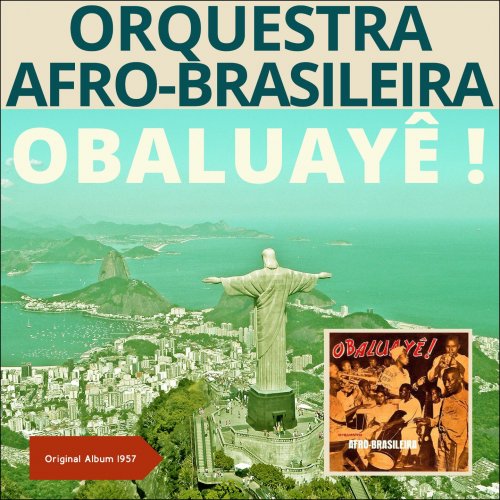
Orquestra Afro-Brasileira - Obaluayê! (Original Album 1957) (2016)
BAND/ARTIST: Orquestra Afro-Brasileira
- Title: Obaluayê! (Original Album 1957)
- Year Of Release: 1957
- Label: Salt & Pepper
- Genre: Afro-Brazilian
- Quality: FLAC (tracks)
- Total Time: 00:24:34
- Total Size: 75 MB
- WebSite: Album Preview
Ground-breaking orchestral jazz rooted in Afro-Brazilian rhythms and Yoruba spirituality, Obaluayê is one of the most important albums in Brazilian musical history.
Little is known about Orquestra Afro-Brasileira, and that which is tends towards folklore. Conducted by maestro Abigail Moura, the group took to the stage around a hundred times between 1942 and 1970, releasing just two records - the eponymous 1968 album Orquestra Afro-Brasileria and Obaluayê, originally released on Todamerica in 1957.
A self-taught conductor and arranger, Abigail assembled Orquestra Afro-Brasileira in order to tell stories of Afro-Brazilian heritage and speak of the “dramas and tragedies experienced by my race”. The Orquestra celebrated significant dates and influential Black Brazilian historical figures in its performances, with a repertoire that moved between folk tales, Candomblé chants and macumbas (or invocations) of orixá - the Yoruba deities sent by Olodumare to provide guidance for life on earth.
Comprised of around twenty musicians, the Orquestra combined traditional Brazilian and West African percussion instruments such as Agogô, Afoxé, Ganzá, Atabaques and Angona-puíta, with the sounds of saxophones, trombones, clarinets and the piano from the big band jazz tradition.
Inspired by the orixá responsible for the balance between disease and cure, Obaluayê opens with a sermon, tracing the origins of the rhythms and their drums to the moments of joy, love and resistance that music provided in the horrific daily conditions faced by African slaves.
For Abigail’s protégé and percussionist on the group’s 1968 album Carlos Negreiros, the power of the message was little short of life-changing: “I became aware of what it is to be black,” he says, “discovering the extraordinary potential of the Afro-Brazilian culture in the making of the national ethos.”
Although overlooked at the time, Orquestra Afro-Brasileira inspired a generation of musicians such as Moacir Santos, as well as an array of contemporary devotees, such as hip-hop pioneer DJ Nuts and Beastie Boys producer Mario Caldato Jr.. That Caldato Jr. has since tracked Carlos down to record a third Orquestra album is a testament to its lasting importance.
Tracklist:
1 01. Orquestra Afro-Brasileira - Apresentação e Chegou o Rei Congo (04:07)
1 02. Orquestra Afro-Brasileira - Calunga (02:21)
1 03. Orquestra Afro-Brasileira - Amor de Escravo (02:46)
1 04. Orquestra Afro-Brasileira - Saudação ao Rei Nagô (02:59)
1 05. Orquestra Afro-Brasileira - Festa de Congo (03:08)
1 06. Orquestra Afro-Brasileira - Babalaô (03:17)
1 07. Orquestra Afro-Brasileira - Liberdade (03:03)
1 08. Orquestra Afro-Brasileira - Obaluayê (02:49)
Little is known about Orquestra Afro-Brasileira, and that which is tends towards folklore. Conducted by maestro Abigail Moura, the group took to the stage around a hundred times between 1942 and 1970, releasing just two records - the eponymous 1968 album Orquestra Afro-Brasileria and Obaluayê, originally released on Todamerica in 1957.
A self-taught conductor and arranger, Abigail assembled Orquestra Afro-Brasileira in order to tell stories of Afro-Brazilian heritage and speak of the “dramas and tragedies experienced by my race”. The Orquestra celebrated significant dates and influential Black Brazilian historical figures in its performances, with a repertoire that moved between folk tales, Candomblé chants and macumbas (or invocations) of orixá - the Yoruba deities sent by Olodumare to provide guidance for life on earth.
Comprised of around twenty musicians, the Orquestra combined traditional Brazilian and West African percussion instruments such as Agogô, Afoxé, Ganzá, Atabaques and Angona-puíta, with the sounds of saxophones, trombones, clarinets and the piano from the big band jazz tradition.
Inspired by the orixá responsible for the balance between disease and cure, Obaluayê opens with a sermon, tracing the origins of the rhythms and their drums to the moments of joy, love and resistance that music provided in the horrific daily conditions faced by African slaves.
For Abigail’s protégé and percussionist on the group’s 1968 album Carlos Negreiros, the power of the message was little short of life-changing: “I became aware of what it is to be black,” he says, “discovering the extraordinary potential of the Afro-Brazilian culture in the making of the national ethos.”
Although overlooked at the time, Orquestra Afro-Brasileira inspired a generation of musicians such as Moacir Santos, as well as an array of contemporary devotees, such as hip-hop pioneer DJ Nuts and Beastie Boys producer Mario Caldato Jr.. That Caldato Jr. has since tracked Carlos down to record a third Orquestra album is a testament to its lasting importance.
Tracklist:
1 01. Orquestra Afro-Brasileira - Apresentação e Chegou o Rei Congo (04:07)
1 02. Orquestra Afro-Brasileira - Calunga (02:21)
1 03. Orquestra Afro-Brasileira - Amor de Escravo (02:46)
1 04. Orquestra Afro-Brasileira - Saudação ao Rei Nagô (02:59)
1 05. Orquestra Afro-Brasileira - Festa de Congo (03:08)
1 06. Orquestra Afro-Brasileira - Babalaô (03:17)
1 07. Orquestra Afro-Brasileira - Liberdade (03:03)
1 08. Orquestra Afro-Brasileira - Obaluayê (02:49)
As a ISRA.CLOUD's PREMIUM member you will have the following benefits:
- Unlimited high speed downloads
- Download directly without waiting time
- Unlimited parallel downloads
- Support for download accelerators
- No advertising
- Resume broken downloads


